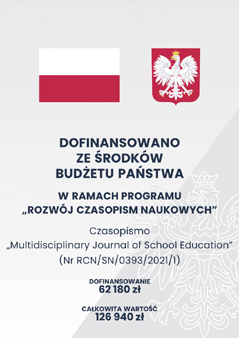The Characteristics of Students who Become Bullies through School Bullying
Abstract
In our research we wanted to vnd an answer to the question: what kind of temperament and character traits do students have who become bullies through school bullying, and what their typical emotional reactions are. In the study 410 children (post-primary education at elementary schools), 205 girls and 205 boys took part. In our research we used the following instruments: the Questionnaire on School Bullying, the Hungarian adaptation of Goch’s Family Socializational, the Hungarian adaptation of the Parental Bonding Instrument, the Hungarian version of Cloninger’s Temperament and Character Inventory, and the Hungarian version of Diterentional Emotions Scale. The results of our research show that increased maternal overprotection as well as a rule or conwict oriented family atmosphere stand in the family socialization background of the students who become bullies through school bullying. The personality of bullies is characterized by a novelty seeking temperament, which is associated with an immature character. The emotions of bullies are characterized by feelings of anger and disgust, which force them to take emotion driven actions. They direct anger in an aggressive way towards their peers. The results of the research also revealed the major gender diterences in the examined velds/areas.References
Busch L., Aggression in der Schule. Präventionsorientierte und diaerentielle Analyse
von Bedingungsfaktoren aggressiven Schülerverhalten, Inaugural-Dissertation, Wettenberg 1998.
Dambach K.E., Mobbing unter Kindern und Jugendlichen Unsere Jugend, “Die Zeitschrift für Studium und Praxis der Sozialpädagogik”, 55/3 (2003), p. 507–516.
Figula E., Margitics F., Pauwlik Z. et al, Az Iskolai Erőszak Kérdőív [The handbook of
the Questionnaire on School Bullying], Nyíregyháza 2008.
Goch I., Entwicklung der Ungewissheitstoleranz. Die Bedeutung der familialen Socialization, Regensburg 1998.
Izard C.E., The Face of Emotions, New York 1971.
Izard C.E., The Psychology of Emotion, New York 1991.
Kassis W., Wie kommt die Gewalt in die Jungen? Soziale und personale Faktoren der
Gewaltentwicklung bei männlichen Jugendlichen im Schulkontext, Bern,
Stuttgart, Wien 2003.
Kathleen R., Bullying auf dem Schulweg: Das Schulbus-Phänomen. Erstellung eines
Persönlichkeitsprocls von Tätern und Opfern. Eine empirische Studie in Thüringen. Dissertation zur Erlangung des academischen Grades doctor philosophiae
(Dr. phil.), Jena 2007.
Korte J., Faustrecht auf dem Schulhof. Über den Umgang mit aggressiven Verhalten
in der Schule, Weinheim, Basel 1999.
Olweus D., Bully/victim problems among school children: Long-term consequences
and an eaective intervention program, in: S. Hodhings (Ed.), Mental disorder
and crime, (p. 317–349), Thousand Oaks, CA 1993.
Margitics F., Figula E., Pauwlik Zs., Temperamentum, karakter és iskolai erőszak,
Nyíregyháza 2010.
Rost D., Handbuch Pädagogische Psychologie, Weinheim1998.
Rózsa S., Kállai J., Osváth A., Bánki M.Cs., Temperamentum és karakter: Cloninger
pszichobiológiai modellje. A Cloninger-féle temperamentum és karakter kérdőív
elhasználói kézikönyve. [Temperament and character. Cloninger’s psychobiologycal model. The handbook of the Cloninger Temperament and Character
Inventory.], Budapest 2005.
Sallay H., Dabert C., Women’s perception of parenting: a German-Hungarian comparison, “Applied Psychology in Hungary”, 3–4 (2002), p. 55–56.
Tóth I., Gervai J., Szülői Bánásmód Kérdőív (H-PBI): a Parental Bonding Instrument
magyar változata. [Perceived parental styles: the Hungarian version of the
Parental Bonding Instrument (H-PBI).], “Magyar Pszichológiai Szemle”,
(1999), p. 551–566.
Ziegler R., Ziegler A., Gewalt in der (Grund) Schule. Analysen und pädagogische Konsequenzen, Aachen 1997.
Copyright (c) 2012 Erika Figula, Ferenc Margitics, Ágnes Petneháziné Harsányi

This work is licensed under a Creative Commons Attribution-NoDerivatives 4.0 International License.
- The Author/Authors agree(s) to publish the article free of charge in Multidisciplinary Journal of School Education in English or Spanish. The Editorial Board reserves the right to shorten the texts and change the titles.
- As part of free publication mentioned in § 1, the Author/Authors agrees to make the full electronic version of their article available in the Internet.
- The Author/Authors agrees to index their article in databases at home and abroad, including abstracts and keywords as well as Author's/Authors’ affiliation in English and in other languages. The Author/Authors agrees to pass on the information mentioned above to the owners of these databases.
- The Author/Authors declares that their publication is original and does not include borrowings from other works which might cause Publisher's responsibility, does not infringe the rights of the third party and that their copyright on this publication is not limited. The Author/Authors will incur all the costs and will pay compensations which might result from the mendacity of the following statement.
- The Author/Authors declares to bear complete responsibility for the scientific reliability of the article submitted. The detailed contribution of all co-authors is defined.
- The Author/Authors declares to publish the text in the Multidisciplinary Journal of School Education under a Creative Commons Attribution-NoDerivatives 4.0 International License (CC BY-ND 4.0).
- For more than one author, please complete the Authorship Contributions and send it to the editorial office. Please indicate the specific contributions made by each author (list the authors’ initials, e.g., JKH). Please download, complete, scan and attach the file in the system during the submission process.
Authors Statement - Authorship Contributions






